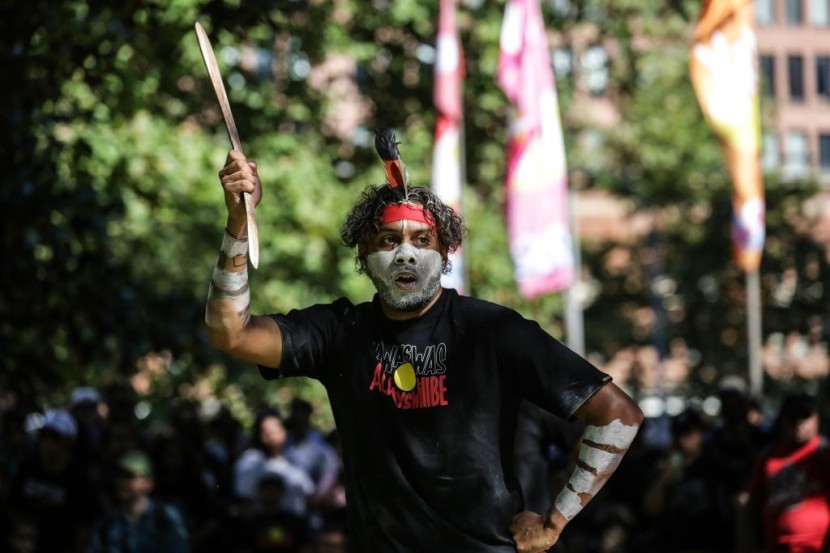
Communities across Australia rallied Sunday (July 2), supporting a referendum calling for Indigenous constitutional recognition through what they call the Voice to Parliament Referendum.
Dubbed "Come Together For Yes," organized by the Yes23 campaign, the events included family-friendly community events such as speeches, workshops, and live music and dance. Some of the larger rallies were held in the country's state capitals, like Sydney and Melbourne, as well as in the national capital Canberra.
The vote on the Voice may occur anytime after August 19 but is widely expected to occur by October.
What is the Voice?
The Voice provides permanent representation and recognition for Aboriginal and Torres Strait Islander peoples in the Australian Constitution. It is a body representing Indigenous Australians to provide their input into the decisions, policies, and laws made by the government and parliament.
The concept of the Voice, according to its proponents, was consistent with the UN Declaration on the Rights of Indigenous Peoples, especially the Indigenous peoples having a right to participate in government decision-making in matters affecting their rights through their own political institutions.
If the referendum favors the amendment, the Voice would be constitutionally enshrined and protected as the ninth chapter of the Australian Constitution, which meant successive governments could not overturn it.
What the Voice is not is that it is neither a "third chamber" of the Australian federal parliament nor a body with any veto power. The government and parliament are also not compelled to follow such representations. Instead, the Voice would create a mechanism designed to improve decisions, policies, and laws through First Nations input on matters that affect them.
What is the Voice referendum?
The Voice to Parliament referendum would ask the Australian people whether or not they support a constitutional amendment to create the Voice as a vital part of the Australian government and parliament.
The draft question formulated by the Australian Electoral Commission put to voters was whether or not to amend the Australian Constitution "to [recognize] the First Peoples of Australia by establishing an Aboriginal and Torres Strait Islander Voice." It was first published in a bill introduced into the country's federal parliament in late March.
Read Also: HNGN's Latest News about Australia
Who is Yes23?
Yes23 is a campaign led by Australians for Indigenous Constitutional Recognition. It is an organization dedicated to educating and raising awareness about the Uluru Statement from the Heart, aside from its push to enshrine the Voice to Parliament constitutionally.
The campaign stressed that the Australian Constitution has not yet recognized Indigenous peoples by giving them representation and suggestive power in government policies. It also said voting in favor of the Voice would not only result in a symbolic recognition but also a practical one.
"A constitutionally protected Voice gives Aboriginal and Torres Strait Islander people a direct say in the laws that affect them, allowing for real solutions to the challenges imposed on them in areas like jobs, health, education, and justice," the campaign said in its website.
Who Campaigns to Vote 'No'?
While many came out in support of the Voice to Parliament referendum, polling shows the "no" campaign was gaining momentum.
A recent Newspoll survey showed 47% of Australians would vote "no" to the referendum against 43% of those likely to vote "yes." Alongside these numbers is the drop in the approval rating of the Labor government of Prime Minister Anthony Albanese.
The trend was similar in a recent Resolve Political Monitor poll, where "no" votes lead ahead of "yes" at 51-49.
Broken down, a majority of Australian states are not in favor of the Voice referendum. The only exceptions were Victoria and New South Wales. The referendum would only succeed if four of the six Australian states and a national majority voted "yes."
Australian opposition leader Peter Dutton particularly lashed out at Australian mining giants and other big companies for donating to the "yes" campaign, saying they "lacked a significant backbone" regarding the referendum.
"There are a lot of people who are just craving popularity and are trying to please people in the Twittersphere," he told Sky News.
Independent Australian senator Lidia Thorpe claimed a "yes" vote would mean nothing. "It's a real slap in the face for all of those warriors that have fought, who died, to think that we're looking at a powerless voice that may give advice," she told an eco-socialism conference in Melbourne.
Meanwhile, National Party leader David Littleproud doubled down on his party's opposition to the referendum. "It is not necessarily who is selling the Yes case, it's actually what they're selling," he added.
Yet despite the negative swing, Australians for Indigenous Constitutional Recognition co-chair Rachel Perkins was confident the "yes" camp would prevail as it was slowly being discussed in everyday Australian life. "What the polls don't really accommodate is this huge growing movement of the Australian people," she added.
© 2026 HNGN, All rights reserved. Do not reproduce without permission.







